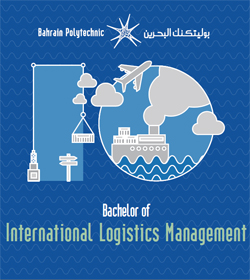- 8 Semesters (Full-Time)
Programme Entry Requirements
Applicants must achieve the minimum requirements in the English and Mathematics entry tests OR passing Maths and English courses in the Foundation programme.
Course FeesApply Now
Introduction and Programme Aims
The transport and logistics industry is one of the sectors seen as critical to Bahrain’s 2030 Economic Vision. This includes the different modes which, when joined together, are referred to as the global supply chain and are made of separate, yet interconnecting, industries. These industries include maritime, ports, aviation, road, rail, warehousing and logistics.
The Bachelor of International Logistics Management programme aims to;
- Prepare students for positions in middle management and other roles as future transport and logistics professionals, transport and environmental policy analysts, planning professionals and consultants, and transport service providers who can take leadership positions in a sector facing change;
- Provide students with the skills to manage change associated with the way transport systems and networks adapt to external circumstances;
- Develop students’ ability to think critically and analyse opportunities arising from the adaptation and development of various transport modes; how to plan global supply chains and manage transport networks effectively; and
- Raise awareness of growing environmental concerns in global and local transport, including energy supply, alternative fuels and carbon emissions.
Students can choose to develop their understanding of one of four sectors that are viewed as critical to the future of the logistics industry in Bahrain. The sections are Maritime Logistics, Aviation Logistics, Supply Chain Management and Transport Security.
To view the courses of this programme, please click on the link below:
Graduate Profile
Graduates with a Bachelor of International Logistics Management will be able to:
- Operate effectively in a transport and logistics environment;
- Demonstrate effective thinking and problem-solving to plan and analyse transport and logistics systems, including communication systems;
- Explain the complex relationships between land/sea/air use and transport networks that give rise to transport and logistics demands and recognise how they blend together to create the global supply chain;
- Use transport network analysis and critical thinking to develop solutions that solve transport and logistics problems;
- Apply an in-depth understanding of how transport hubs function and how they contribute to the local and global marketplace;
- Identify and analyse critical issues relating to energy and transport;
- Apply principles of urban and regional transport planning in Bahrain;
- Analyse the environmental effects of the industry from a local, regional and global perspective and utilise knowledge and skills to seek solutions to limit the negative effects on the industry; and
- Practice as a professional using 21st century skills.
Career Opportunities
- Public Transport Manager
- Import/Export Manager
- Warehouse or Logistics Supervisor /Manager
- Inventory Controller / Supervisor / Manager
- Supply Chain Planner / Manager
- Business Development Manager
- Freight Forwarding Manager
- Airport and Airfreight Operations Manager
- Aviation Planning, Policy and Regulation Development Manager
- Policy and Planning Development Manager
- Military and Enforcement (Navy, Customs, Police)
- Warehouse Plant Operator
- Customs Broker
- Fleet Manager
- Procurement Officer / Manager
- Container Planning and Distribution Manager or Controller
- Maritime / Port / Aviation Security
- Yard Planner
- Shipping Agent
- Container Inspector
- Aviation Cargo Agent
Other: - Further Fields of Study i.e. postgraduate studies or professional qualifications
Teaching and Assessment
Teaching will focus on a student-centred approach and developing learner autonomy. Level 7 and 8 courses are specifically aimed at developing the skills that a future manager in the sector requires. There is also a purposeful move toward more independent learning and research so the student develops advanced managerial skills. Students will be expected to think critically around problems, seek solutions and communicate in an industry specific way. The programme utilizes a range of assessment tools, which can be conducted on an individual or group basis, such as projects, case studies, essays, examinations, and online tests.
Qualifications
To be awarded a Bachelor of International Logistics Management, students must achieve 480 credits meeting specified requirements. Students may also study the required courses to receive the following embedded qualifications from the Chartered Institute of Logistics and Transport International:
- CILT Professional Diploma in Logistics and Transport
- CILT Advanced Diploma in Logistics and Transport
Students may also exit with a Diploma in Logistics and Transport upon achieving 240 credits which meet the specified requirements.
Accreditation and Partnerships
- Chartered Institute of Logistics and Transport (CILT UK).
- Chartered Institute of Logistics and Transport International (CILTi)
- The Bachelor of International Logistics Management includes embedded qualifications from the Chartered Institute of Logistics and Transport (CILT).
Industry Project
The more advanced courses focus increasingly on industry placement. The intention is to give students an industry understanding prior to graduation as well as providing them an opportunity to develop their own industry networks.
Summary of Programme Structure
To be awarded a Bachelor of International Logistics Management degree, students must complete a four-year programme of study.
In the first two years of the programme, students study core transport and logistics courses which provide the foundation for more specialised year three and year four courses. Students must also take compulsory English course and elective courses. All students are required to complete an Industry-based Project to graduate.
Academic advising is available to students throughout their time on the Bachelor of International Logistics Management programme.
Specific courses being delivered in this programme can be found at the Polytechnic’s website under “Bachelor of International Logistics Management”.




